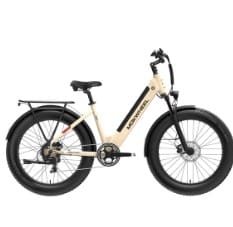
Colorado E-Bike Regulations: Rider’s Guide

In the picturesque landscapes of Colorado, electric bikes (e-bikes) have become increasingly popular for both commuting and recreational purposes. However, with this surge in popularity comes the need to understand the specific regulations that govern e-bike usage in the state. Here’s a comprehensive look at Colorado’s e-bike laws as of 2024.
Understanding E-Bike Classifications
Colorado adopts a three-tier classification system for e-bikes, which is critical for determining where and how you can ride:
- Class 1 E-Bikes: These provide pedal assistance only when the rider is pedaling and cut off assistance at 20 mph. They are allowed on bike paths, multi-use trails, and roads where traditional bicycles can go, unless otherwise noted by local regulations.
- Class 2 E-Bikes: Similar to Class 1, but they also include a throttle to propel the bike without pedaling, stopping assistance at 20 mph. These e-bikes share the same access as Class 1 on most paths and roads.
- Class 3 E-Bikes: These offer pedal assistance up to 28 mph. They are restricted to roadways and cannot use bike or pedestrian paths unless explicitly allowed by local jurisdictions. Riders under 18 must wear a helmet when operating a Class 3 e-bike.
General State Regulations
- No License Required: In Colorado, you do not need a driver’s license, registration, or insurance to operate an e-bike.
- Age Restrictions: There is no minimum age requirement for Class 1 and Class 2 e-bikes. However, riders must be at least 16 years old to operate a Class 3 e-bike.
- Helmet Laws: While helmets are not universally mandated for all classes, they are required for riders under 18 on Class 3 e-bikes. Common safety practices suggest helmets for all riders regardless of age or class.
- Speed Limits: E-bikes must adhere to the same speed limits as traditional bicycles when on public roads or paths.
Local Jurisdiction Variations
- Local Ordinances: Cities and counties in Colorado may have their own rules. For example, Boulder might restrict e-bike use on some trails, or Denver might have specific regulations for sidewalk usage. Always check local laws before riding.
- Trail Access: While state law provides a general framework, local land managers can further restrict or allow e-bike access on trails. Class 3 e-bikes face more stringent restrictions in many areas, often barred from bike paths unless local rules state otherwise.
Regulations on Public Lands
- State Parks: Class 1 and Class 2 e-bikes are generally allowed on paths where regular bikes can go, but always check with Colorado Parks and Wildlife for specific park regulations.
- Federal Lands: The Bureau of Land Management (BLM) and other federal agencies can have their own rules. E-bikes might be allowed on motorized trails or where bikes are generally permitted but check with the specific land management office.
Safety and Compliance

- Equipment: E-bikes must have adequate safety gear, including a white front light visible from 500 feet, a red rear reflector visible from 600 feet, and brakes capable of stopping within 25 feet on dry pavement.
- Penalties: Misuse or modification of e-bikes beyond their class specifications can lead to fines. For instance, altering a Class 1 e-bike to exceed 20 mph could result in a Class B traffic infraction.
Conclusion
Colorado’s approach to e-bike regulation aims to balance access with safety, ensuring that these innovative vehicles can be enjoyed while preserving the state’s natural beauty and public safety. Whether you’re exploring urban bike paths or venturing into the wilderness, understanding these regulations is key to a smooth and legal e-biking experience. Remember, local rules can vary significantly, so before you ride, a quick check of local laws will ensure you’re not only enjoying your ride but doing so within the law.
For the most accurate and up-to-date information, riders should consult local government websites or contact local authorities directly. Enjoy Colorado’s vast landscapes responsibly with your e-bike, knowing you’re well-versed in the state’s e-bike regulations.

